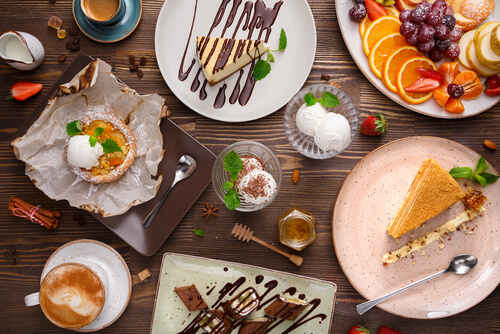It’s the most wonderful time of the year. But it can also be the most stressful.

From trying to find the right gifts for everyone on your list, to hitting up various holiday parties, to just trying to get along with your family members—this season is packed with more than just a cup of cheer. Truth is, it’s all too easy to get overwhelmed with the Christmas spirit—and overextend yourself in the process.
But fear not: It doesn’t have to be that way. You can choose to go back to basics. You can choose a more peaceful route. You can choose tranquility over tension and awe over anxiety. There are even science-backed ways that can help reduce stress and promote peace in your life, regardless of season. Perhaps it’s time to choose those, too.
It’s time to reset. It's time to relax. It's time for some self-care. Read on to find nine tips and tricks for reestablishing a sense of serenity, no matter what’s going on in your life.
Because we all deserve a Silent Night now and again, am I right? Hallelujah.
1. Take a deep breath.
One of the simplest ways to reconnect with yourself and re-center is to get still and just breathe. Focusing on your breath can help you send more oxygen to your brain, allowing you to think more clearly. It can also help you calm down since we often forget to take deep breaths when we are stressed out. Going deeper into breath work with mindfulness and meditation has even been linked to psychological well-being and other positive effects.
I don’t know about you, but whenever I’m feeling stressed out, connecting to my breath helps me stop the endless thoughts and strip everything back to the bare essentials—ultimately helping me to restore a sense of peace.
It’s truly a wonder what a little air can do.
2. Sneak in a workout.
Want to get it out? Sweat it out!
It should come as no surprise that hitting the gym is one of the most effective ways to let off some steam. Whether going for a run on the treadmill, climbing the Stairmaster or lifting some weights, working out releases mood-boosting endorphins and can jumpstart your circulation, sending necessary nutrients all over your body.
So, if you’re feeling stressed or overwhelmed, exercise. Studies show you’ll be glad you did!
3. Watch what you put in your body.
‘Tis the season of cookies and eggnog and pastries and pies. And lots and lots of wine. But all of those complex carbs and drinks probably aren’t helping with your stress. While those treats feel great in the moment, they almost always come back to bite you in the behind because they aren’t what your body really needs.
You need fruits and veggies and whole grains. And lots and lots of water. A balanced diet fuels your body to keep going, giving you all of the necessary nutrients to tackle everything on your to-do list this season.
So, try to practice moderation around the topplay holidays. It’s fine to indulge in dessert if you balance it out with some stuff that’s actually found in nature. And don’t forget to stay hydrated. It can have a major impact on your mood and well-being.
Bottom line: You get out what you put in. It’s true with your body as it is with life in general. Take it easy on the booze and the baked goods—and the caffeine, too. Your body and your mind will thank you.
4. Talk it out with someone.
There are few things in life better than venting to a person you trust. It’s such a weight lifted off of your shoulders to get it all out there and express how you’re feeling in the confines of a safe space. It’s also a great way to get perspective on what you’re going through and to expose your blind spots.
When you’re in the thick of it, it can be difficult to see your way through. Phoning a friend, speaking with a family member or discussing with a licensed professional can bring a deep sense of clarity and relief that you can’t achieve on your own. That social support is critical because it makes you feel understood and validated. And the person on the other end of the line may even be able to make you laugh about it or see the silver lining.
That’s the power that your bonds have in helping you endure life’s challenges. That’s the power of friendship. That’s the power of communication.
5. Get out into nature.
If you’re feeling hassled by the holidays, it may be time to stop and smell the roses. And, by that, I mean get out outside and take in a little bit of the great outdoors.
What better natural remedy than, well, nature itself? Study after study has touted the benefits some fresh air can have on your mental health.
Walks outside have been linked to better mood. Greenery has been shown to increase creativity. Simply looking out a window at trees and other foliage can help you heal faster, too.
So, take a hike. Walk your dog. Enjoy a stroll through a park. It’ll not only keep you physically active, it’ll help comfort your mind as well.
6. Hug it out.
Touch is one of the quickest ways to dispel your bad vibes. From cuddling or a massage to hugging or physical intimacy, being touched by another human nurtures and soothes your body, mind and spirit. And it releases a feel-good chemical called oxytocin.
Oxytocin, also dubbed the “cuddle hormone,” is a powerful neuropeptide that can ease stress and boost your mood. So, next time you’re feeling down on yourself, ask a friend for a quick hug, request a back rub from your significant other or curl up with a pet on the couch.
Turns out, a simple touch can go a long way to helping you be happier and less stressed.
7. Practice gratitude.
I’ve written extensively about gratitude and the power of thank you on this blog because I sincerely believe in its ability to fundamentally improve your life.
At its core, gratitude is an immensely impactful way to shift your perspective and to learn to appreciate the twists and turns of life. After all, the storms of life help you shed your false self and slowly but surely become more of who you are at your core—the person you always were that was buried underneath everything you thought the world expected of you.
Gratitude is a well of peace and clarity that you can tap into regardless of the goings on in your life. And it can give you the strength to carry on when times are tough.
Studies have indicated that being grateful can even have a plethora of positive impacts on your state of mind and your happiness in general.
So, go ahead—put gratitude into practice in your daily life. You really don’t have anything to lose.
8. Get some rest
Too often, we run our energy reserves dry and sleep is the first thing to fall to the wayside. But sleep is one of the most soothing things you can do for your body because it’s a chance for your system to restore and repair itself. Honestly, snoozing is a great way to shape up and catch up no matter what’s going on around you.
Feel like you need a break? Try getting some shut-eye.
Overwhelmed and not sure how to navigate another day? Try catching some ZzZ’s.
Hurting all over and not sure if you’ll ever feel better? Rest up and heal up.
Research suggests that losing even a little sleep can have a huge impact on your mood and your ability to achieve peak performance. So, when times get tough, start countin’ sheep. It might just be the reset you need.
9. Help others.
When you’re stressed, putting others ahead of yourself is the last thing that probably pops into your mind—and for good reason. Stress, especially in extreme forms like anxiety, can make you feel like you’re experiencing a crisis. And, in a lot of ways, your body truly is, at least from a physiological standpoint. The fight or flight response is strong, ya’ll.
But if you can, connecting with others by giving back can have a wide array of amazing benefits for your mental health and well-being. Volunteering at a soup kitchen, for example, is a great way to distract yourself from your hectic holiday schedule and give back to those in need—and it can really help you put your problems into perspective.
So, practice a little altruism. Happiness is contagious, after all.




















